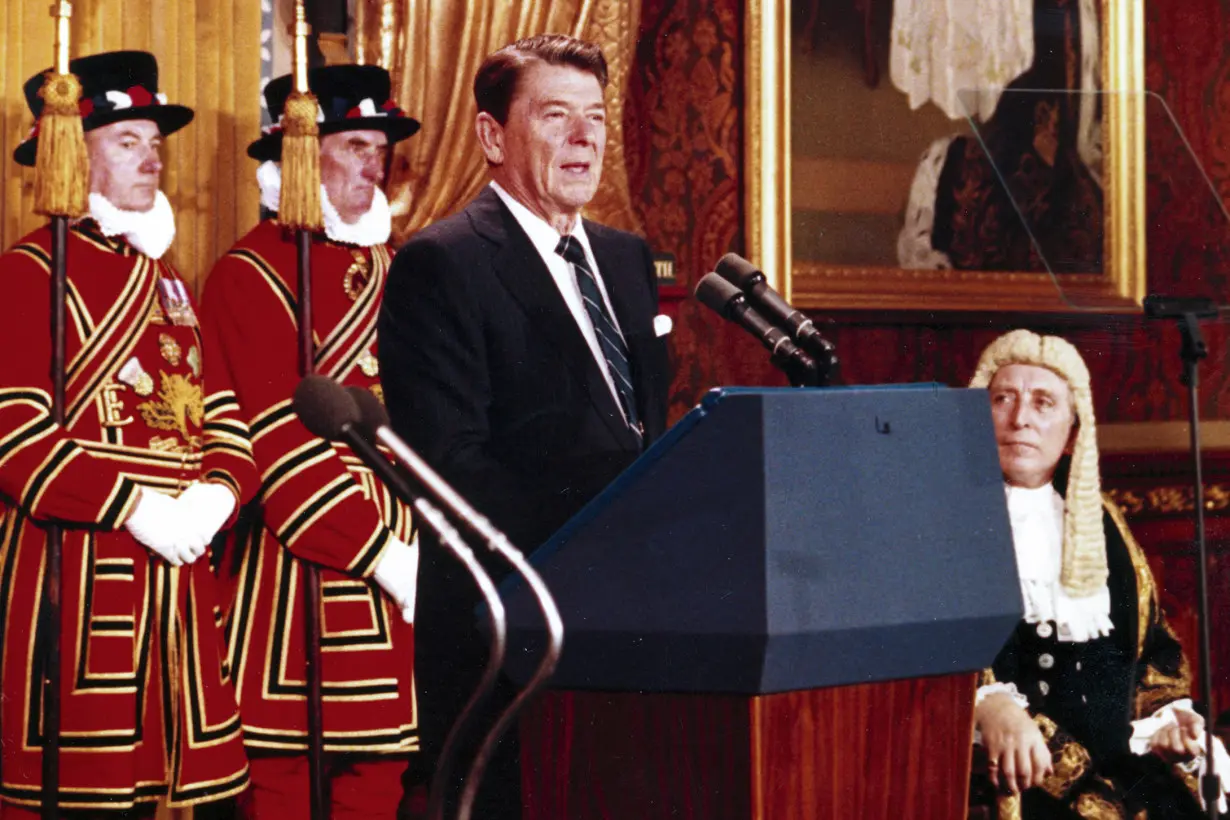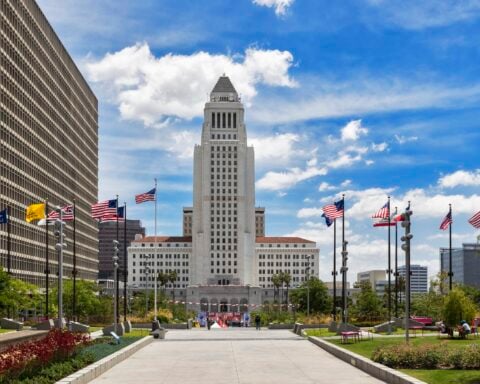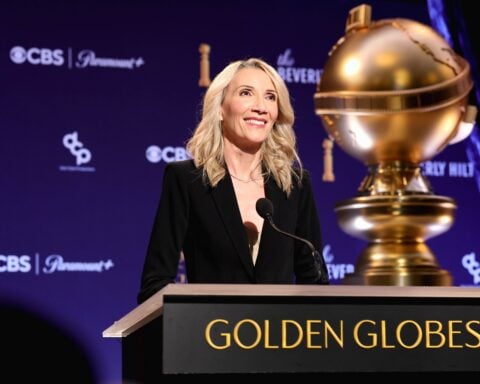The words don't stir the collective national memory like, “ Mr. Gorbachev, tear down this wall."
But for students of Ronald Reagan's more notable speeches, “the ash heap of history" may ring a bell, one chiming regularly during the 2024 Republican presidential campaign.
Former South Carolina Gov. Nikki Haley has promised to send the People's Republic of China to the metaphorical refuse pile. Florida Gov. Ron DeSantis lists several policies he would consign there as president. Former Vice President Mike Pence simply wants the overturned abortion-rights decision in Roe v. Wade to stay put there.
As most Republican White House hopefuls gather Wednesday at Reagan’s presidential library for a debate, expect to hear more homages to the “Great Communicator.” The references — and the embrace of some of his rhetoric — reflect how the party has changed, as those seeking to portray themselves as heirs to Reagan’s optimistic conservative vision also regularly resort to a style of attack and grievance more often associated with former President Donald Trump.
“If you understand American history, you see over and over and over again the capacity for this country to pull itself together,” said Peter Robinson, a former White House special assistant and speechwriter who drafted Reagan's famous 1987 Berlin Wall speech. “That’s fundamentally what Ronald Reagan grasped.”
Like any savvy Republican candidate, Haley, DeSantis and Pence are wise to cull Reagan's speeches for turns of phrase, even if the references are unrecognized as such by most voters, Robinson and others who helped craft them say.
“Speechwriting in the Republican universe tends to start by reading Ronald Reagan’s speeches,” said Ken Khachigian, a White House speechwriter for Reagan who also drafted remarks for Reagan's 1980 and 1984 campaigns. “No candidate loses out by reading and becoming familiar with Reagan’s speeches."
Even if the “ash heap speech” isn't well-known to voters, it was among Reagan's most significant addresses. It was delivered in June 1982 as Reagan, speaking to the British Parliament, called for nothing short of the total demise of the Soviet Union.
“What I am describing now is a plan and a hope for the long term, the march of freedom and democracy which will leave Marxism-Leninism on the ash heap of history,” Reagan said in the ornate Royal Gallery of London’s Palace of Westminster.
Reagan came into office with the United States facing soaring inflation, unemployment and interest rates. He had spent the first year of his presidency focusing primarily on the economy. He used the speech to Parliament to say the U.S. should take the offensive in the Cold War and to make a global push to end communism without military intervention, said Anthony Dolan, Reagan's chief speechwriter, whose draft Reagan had chosen over others.
“This was Reagan’s first speech abroad and it was a great test for him,” Dolan said. “It had such resonance with conservatives because there had been no similar call from Western statesmen."
Haley, who was Trump's U.N. ambassador, has come closer than her 2024 GOP rivals to using the term in its original context.
In an economic policy speech Friday in New Hampshire, Haley said, "Freedom has always been our secret weapon. It broke the Soviet Union’s back without firing a shot. And freedom can lift America to new heights, leaving Chinese communism on the ash heap of history.”
Haley had used a version of it during a speech two years earlier at the Ronald Reagan Presidential Library. And a clip of a similar use of the term during her February announcement of her candidacy has been airing in a political ad across Iowa since last month.
In July, DeSantis promised during a social conservative conference in Des Moines to kill the federal government's effort to create digital currency. DeSantis described the effort as “a massive threat to American liberty and on Jan. 20, 2025, it goes to the ash heap of history in this country.”
DeSantis often uses a variation, as he did at a fundraiser for Iowa Attorney General Brenna Bird last month. In a regular refrain condemning teachings on race and gender in schools, he told the audience at the Dallas County fairgrounds west of Des Moines, "As president we’ll be sure to leave the woke agenda in the dustbin of history where it belongs.”
In a twist, DeSantis' modification actually echoes Russian revolutionary Leon Trotsky, who told his political rivals in 1917 to “go where you belong from now on, into the dustbin of history.”
Reagan and other leading anti-communists were well-studied on the writings and speeches of Trotsky and Vladimir Lenin, Dolan said, making the line from Reagan's 1982 speech an unmistakable slap.
“We were laughing so hard because he had dared to turn their rhetoric back on them,” Dolan said. “So, he quite deliberately was using it to throw it back in the communists' faces.”
Among the GOP candidates running for president today, Pence most often cites Reagan. Pence notes his pride in advising the Trump administration's Supreme Court nominees “that sent Roe. v. Wade to the ash heap of history where it belongs,” as he said during a meeting of thousands of evangelical conservatives in Des Moines on Sept. 16.
Pence attributes his conversion from Democrat to Republican to hearing Reagan speak in 1980, and often mentions using Reagan's Bible during his swearing-in as vice president in January 2017.
Vivek Ramaswamy, the 38-year-old biotech entrepreneur from Ohio who is also running for the White House, has used references from the Reagan era against Pence. During the GOP presidential debate in Milwaukee last month, Pence objected to Ramaswamy's claim that the United States was undergoing an “identity crisis." by saying, “We just need government as good as our people.”
“It's not morning in America,” Ramaswamy retorted, reviving a line from a memorable Reagan's 1984 reelection campaign ad that sought to demonstrate what the country had overcome in Reagan's first term. “We live in a dark moment."
Trump is skipping the California debate. Despite his stylistic differences with Reagan, Trump long ago adopted as his slogan “make America great again," a line from Reagan's Republican National Convention acceptance speeches in 1980 and 1984.
“Reagan’s entire approach was somehow or other — almost the deep structure of the universe itself — that the underlying reality is good,” said Robinson, the former Reagan speechwriter who is now a policy fellow at Stanford University's Hoover Institute. “We need a renewal, and we begin by searching for a candidate who believes, as Reagan did, that it’s possible, as indeed of course it is.”

 Edmunds: These are the best full-size trucks for daily driving and off-roading
Edmunds: These are the best full-size trucks for daily driving and off-roading
 Guardian newspaper confirms sale of Sunday sister paper The Observer to Tortoise Media
Guardian newspaper confirms sale of Sunday sister paper The Observer to Tortoise Media
 Seeing Trump 2.0 tariffs coming, America's toymakers gird for ruckus
Seeing Trump 2.0 tariffs coming, America's toymakers gird for ruckus
 Who are the immigrants who could be targeted in Trump's mass deportation plans?
Who are the immigrants who could be targeted in Trump's mass deportation plans?
 UK factories report plunge in output, adding to economic slowdown signs
UK factories report plunge in output, adding to economic slowdown signs
 Two-time World Cup winner and former USWNT captain Becky Sauerbrunn announces her retirement
Two-time World Cup winner and former USWNT captain Becky Sauerbrunn announces her retirement
 A flight was delayed in Atlanta for over an hour. An Army vet got his sax from the overhead bin and played Christmas songs
A flight was delayed in Atlanta for over an hour. An Army vet got his sax from the overhead bin and played Christmas songs
 The Showdown: Rory McIlroy and Scottie Scheffler cruise past Bryson DeChambeau and Brooks Koepka to claim $10M crypto prize
The Showdown: Rory McIlroy and Scottie Scheffler cruise past Bryson DeChambeau and Brooks Koepka to claim $10M crypto prize








